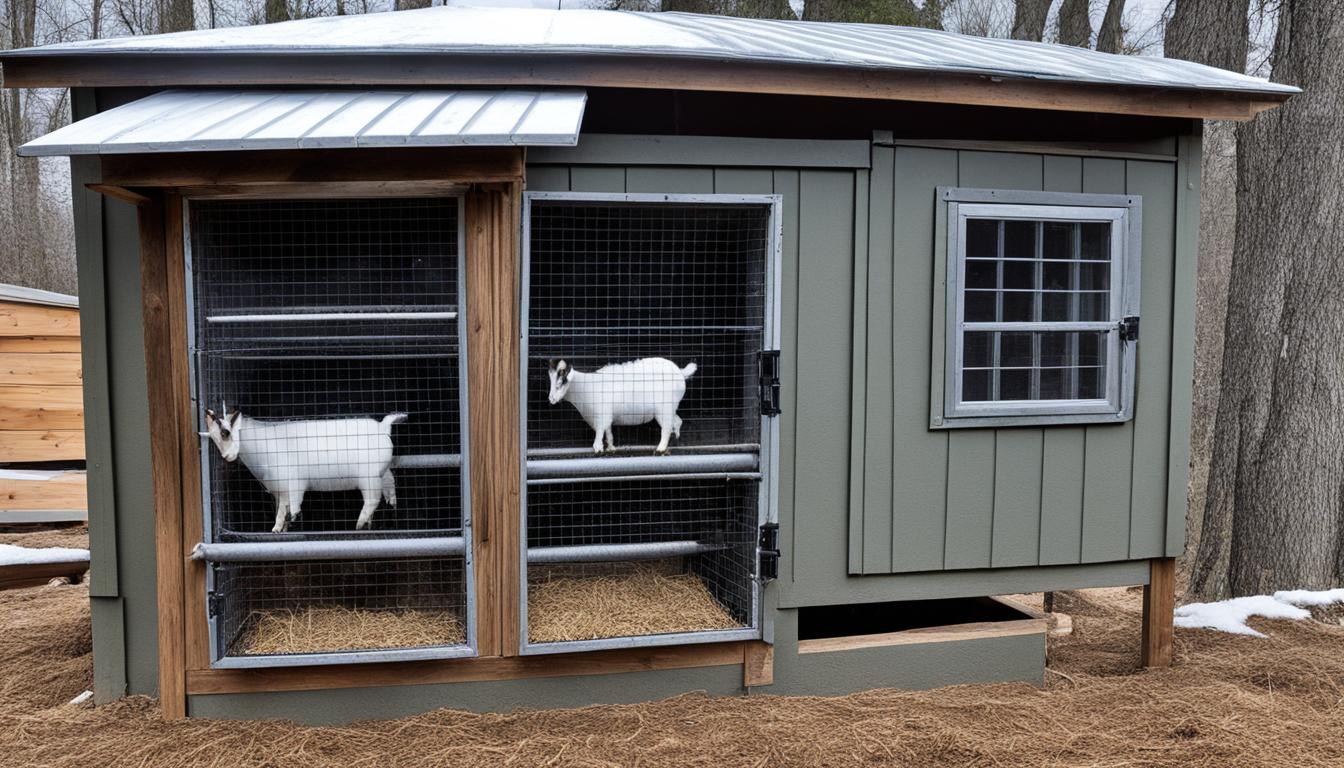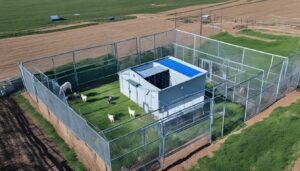Being a pygmy goat owner means I’ve learned firsthand the importance of a dry home. Not just for my goats’ happiness, but also for their health. Over time, I’ve picked up tips and tricks to keep their house dry. And I’m excited to share these with you. This guide will help you keep your pygmy goat house free from moisture.
Good ventilation, proper insulation, managing bedding well, and controlling humidity are key. If these aspects are overlooked, you might face issues such as sickness and mold. I will explain each of these points in detail. By the end, you’ll know how to best care for your pygmy goats’ house.
Making the right home for your goats is crucial, beyond the physical structure. We need to think about how much space they have and what temperatures they feel best in. This article will guide you, ensuring your pygmy goats are happy and healthy at home.
Key Takeaways
- Proper ventilation is crucial for removing excess humidity and maintaining a healthy, dry environment for pygmy goats.
- Insulation plays a vital role in keeping the goat house warm and preventing moisture buildup.
- Careful bedding management, including the choice of bedding material and frequency of changes, can significantly impact moisture control.
- Humidity control techniques, such as using dehumidifiers and improving air circulation, can further enhance the dryness of the goat house.
- Establishing the right goat housing requirements, including space, temperature, and humidity levels, is essential for the overall health and well-being of your pygmy herd.
Importance of Proper Ventilation
Keeping the airflow right is key to stopping moisture in a pygmy goat’s home. Proper ventilation takes out too much water in the air. It gives your goats clean air and a place that’s good for them. With good air flow, you fight high moisture well.
Benefits of Good Air Flow
Having the best ventilation plan for your pygmy goat house is very helpful. It can lower the amount of ammonia. This helps your goats’ breathing stay okay. Plus, good air flow makes it so you control the space’s temperature. That keeps your goats comfortable.
Ventilation Strategies for Pygmy Goat Houses
To get the air right in your pygmy goat house, try a few different ways. Put in windows, vents, and fans to move the air well. Doing this keeps the air from getting too damp. It helps you keep the space dry and good for your pygmy goats.
Insulation: Keeping the House Warm and Dry
Proper insulation is key for a warm, dry pygmy goat house. It keeps heat in, stops moisture, and makes your goats feel great. You can choose from many insulation types, each with its benefits.
Types of Insulation Materials
In a goat house, you might use fiberglass, cellulose, or foam. Fiberglass is good at trapping heat and sound. Cellulose is made from recycled stuff and covers well. Foam, like spray foam, keeps air and water out better. What you pick depends on your climate, what you can spend, and what your goats need.
Installing Insulation in Your Pygmy Goat House
Putting insulation in the walls, ceiling, and floors can help a lot. It stops too much water and keeps it cozy. Make sure it’s put in well. Seal up any holes or leaks and spread the insulation evenly. Doing this right helps your goat house stay comfy and dry all year.

Bedding Management for Moisture Control
Keeping your pygmy goats’ living area dry is vital. The bedding you pick and how often you change it impacts moisture. This affects your goats’ home’s comfort.
Choosing the Right Bedding Material
Pine shavings or straw are great for bedding. They absorb well and control smell. These materials keep your goat house dry and cozy.
Deep Litter Method vs. Frequent Bedding Changes
There are two main ways to manage bedding: the deep litter method and changing it often. The deep litter method means a thick layer that you top up when needed. It can keep your goats warm but needs watching to avoid too much moisture. Frequent changes, though more work, keep things dry and clean.
Picking the right bedding and how often to change it is key. This keeps moisture low, which is good for your goats’ health. It also helps keep their space clean, making them happier.
How do I prevent moisture buildup in a pygmy goat house?
To prevent moisture buildup in a pygmy goat house, you need to do a few things. Make sure there’s enough fresh air getting in. Keep the place warm but not too moist by using the right materials. Also, clean the bedding often to stop moisture from building up.
Good ventilation means the air can move freely, taking away moist air. You should add windows, vents, and fans. This keeps the air in the goat house from getting too wet.
Using the correct insulation stops the cold from getting in and the wet from getting out. Pick materials like fiberglass or cellulose. Put them in the walls, ceiling, and floor right to help keep things dry.
Choosing the right bedding and taking care of it makes a big difference too. Materials like pine shavings or straw soak up extra moisture. Changing or cleaning the bedding often will help keep things dry and smell-free.
Using tools like dehumidifiers or just making sure air can move around well can also help. This stops the air from getting too damp. It makes a better home for your pygmy goats.

Humidity Control Techniques
Keeping your pygmy goats’ environment comfy and dry is important. Humidity control plays a big part in this. Using good ventilation, insulation, and specific techniques can stop too much moisture in the goat’s living space.
Using Dehumidifiers
Dehumidifiers are a great way to lower the moisture in the air. They work by taking out extra humidity. This makes the air drier and nicer for your pygmy goats. Having dehumidifiers placed in the right spots can really boost humidity control and keep your goats healthy.
Improving Air Circulation
Another way to help with humidity control is to increase air flow. You can do this by adding fans or more vents. This helps the air to move better, which allows for faster drying and reduces moisture levels. It’s a great idea to use fans and dehumidifiers together for the best effect.

Goat Housing Requirements for Optimal Health
It’s critical to meet the required goat housing requirements for pygmy goats. This ensures they stay healthy and happy. Important aspects include enough space, the right flooring, and access to food and water. It’s also necessary to keep the house at the correct temperature and humidity levels.
To make a perfect pygmy goat house, key factors should be kept in mind:
- Spacious and well-ventilated living quarters
- Durable and easy-to-clean flooring materials
- Constant access to fresh, clean water and high-quality feed
- Proper temperature and humidity control to prevent moisture buildup
By addressing these needs, you can prevent health problems. This includes those caused by too much moisture. By doing this, you’re helping your pygmy goats live in a cozy, secure spot.

Maintaining a Clean and Dry Environment
It’s vital to keep the pygmy goat house clean and dry. This prevents moisture from building up and keeps the animals healthy. To do this, make sure to clean often. Remove any dirty bedding, sweep, and disinfect regularly. This process helps the house stay clean and dry. It also gets rid of harmful bacteria and pathogens.
Regular Cleaning Routines
To keep a dry environment, clean the goat house regularly. Take out damp or dirty bedding often. Sweep to get rid of debris and clean the surfaces. By sticking to this routine, moisture won’t build up. This ensures your goats live in a clean and healthy space.
Disinfecting and Sanitizing the Goat House
Sometimes, regular cleaning isn’t enough. It’s key to sanitize the goat house from time to time. This kills harmful bacteria and viruses. Make sure to use a good disinfectant. Always follow the instructions on the disinfectant to properly sanitize the goat house.

Signs of Excessive Moisture and Remedies
Seeing signs of too much moisture in your pygmy goat house means you need to act. These include dampness, mold, and bad smells. It’s key to deal with these moisture problems quickly. This keeps things healthy and cozy for your goats.
Identifying Moisture Issues
It’s smart to check often for too much moisture in your goat house. Watch for damp spots and mold. Odd smells could mean there’s too much moisture. If your goats look sick or their hooves are bad, it could be because of the wetness.
Addressing Moisture Problems in Your Goat House
Once you spot moisture issues, you must act fast. Make sure air flows well by improving ventilation. Try different bedding methods like the deep litter method or change bedding more often. You might also need a dehumidifier. And always keep your goat house clean to fight off moisture.
FAQ
How can I prevent moisture buildup in my pygmy goat house?
To stop moisture in your pygmy goat house, work on gut ventilation, proper insulation, and how you manage bedding. Make sure air can move well. Pick the right insulation and bedding. Using dehumidifiers also helps.
What are the benefits of good air flow in a pygmy goat house?
Good air flow takes out extra moisture and brings in fresh air. This is good for your goats’ breathing. It also keeps bad smells away and the temperature right.
What are some effective ventilation strategies for a pygmy goat house?
For better air, add windows, vents, and fans. This makes sure the air moves all over the space well.
What types of insulation materials can I use in my pygmy goat house?
You can use materials like fiberglass, cellulose, or foam. Each has its own good points. By choosing well, you can keep the place warm and dry.
How does bedding management affect moisture control in a pygmy goat house?
The right bedding and how often you change it can stop too much moisture. Choose the best bedding or use the deep litter method. This is good for your goats and prevents bugs.
What humidity control techniques can I use in my pygmy goat house?
Dehumidifiers can help you pull water from the air. And fans or vents can move the air better. This way, you keep the place from getting too wet.
What are the important housing requirements for keeping pygmy goats healthy?
Your goat house needs enough room, good flooring, and easy access to food and water. The right temperature and humidity are key. These things make sure your goats stay healthy.
How can I maintain a clean and dry environment in my pygmy goat house?
Keep things clean by taking out dirty bedding and sweeping. Use disinfectants too. Doing this often stops bad bugs and keeps your place dry.
How can I identify and address signs of excessive moisture in my pygmy goat house?
Watch out for wet spots, mold, or bad smells to catch moisture problems early. Fixing the ventilation, changing the bedding, and cleaning up deep can make your goat house a nicer place for them.



